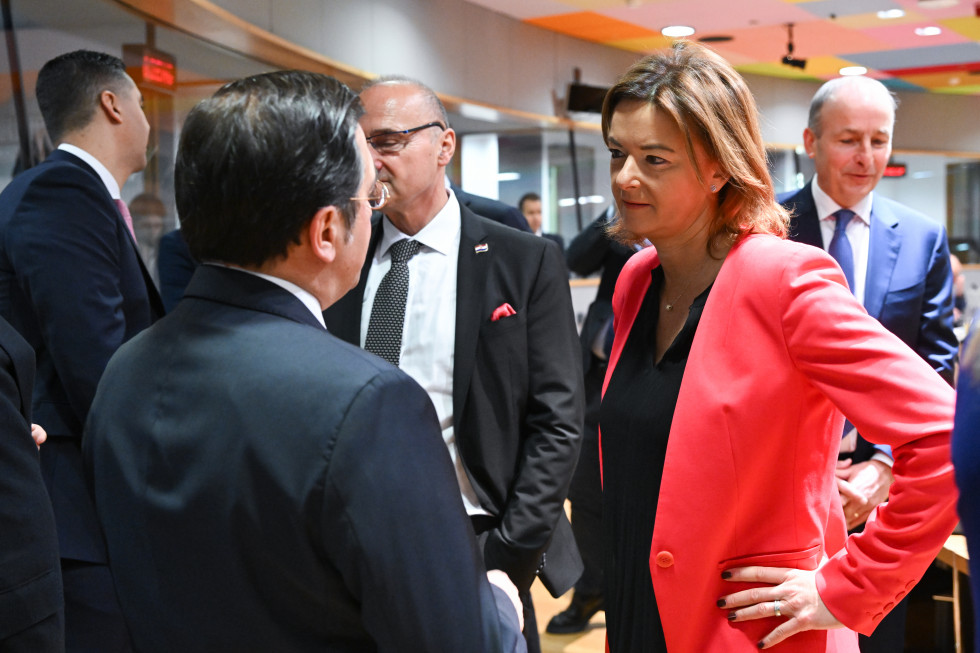Slovenia supports visa bans for extremist settlers in the West Bank and sanctions against Hamas

Minister Fajon attending the EU Foreign Affairs Council | Author EU
Prior to the meeting, Minister Fajon, together with Portuguese Foreign Minister João Gomes Cravinho, convened a meeting with the foreign ministers of Spain, Belgium, Ireland, Luxembourg and Malta to discuss the situation in the Middle East. Ministers called for an immediate and lasting humanitarian ceasefire, visa bans for extremist settlers in the West Bank as imposed by the US, a partnership for a two-state solution and a lasting security for Israelis and Palestinians. Minister Fajon also supported the proposal to tighten sanctions against the Palestinian terrorist organisation Hamas: "I condemn all forms of terror and violence and therefore advocate the tightening of sanctions against Hamas".
“It is essential to establish a humanitarian ceasefire in Gaza to prevent exodus, genocide and ethnic cleansing. A humanitarian disaster of extraordinary proportions is unfolding in Gaza. The death toll, which will soon reach 20,000, is appalling. I regret that the UN Security Council did not adopt the resolution co-sponsored by Slovenia on Friday. Nevertheless, we will continue to work for a lasting ceasefire, the protection of civilians and the release of all hostages. This is our duty," stressed Minister Fajon, adding: "We must work towards a peace plan. If a peace conference can identify decisive steps towards a two-state solution within a certain timeframe, I fully support it. The ultimate goal is for Israelis and Palestinians to live side by side in peace. Time is running out."
At this year's Foreign Affairs Council, ministers once again devoted much of their attention to Russia's aggression against Ukraine. The debate was opened by the Ukrainian Foreign Minister, Dmytro Kuleba, who outlined the current situation in his country. Minister Fajon condemned the Russian aggression against Ukraine and pledged Slovenia’s continued support for Ukraine as long as necessary, considering the sustainability of support for the Slovenian economy and people. She encouraged Ukraine's European and Euro-Atlantic path, noting that negotiations must run in parallel with the reform process, while also maintaining attention and pro-active engagement in the Western Balkans. In this context, she stressed that Slovenia would actively provide humanitarian demining assistance to Ukraine and psychosocial support to children.
In the margins of the meeting, the Minister met with the High Representative for Bosnia and Herzegovina, Christian Schmidt, to discuss EU enlargement to the Western Balkans, focusing on the latest EU enlargement package. "Slovenia supports the start of accession negotiations with Bosnia and Herzegovina by the end of 2023, as enlargement is of utmost importance. We have a strong commitment to the Western Balkans. We would like both the EU and the candidate countries to be ready for enlargement by the end of 2030, and we will accompany Bosnia and Herzegovina on this path," said Minister Fajon.
Ministers also discussed the deteriorating security and humanitarian situation in the Sahel and how the EU can best address these challenges: "The EU must take an integrated approach to the region, focusing on the root causes of cross-border organised crime, terrorism and violent extremism. In this respect, we support an active role for regional actors."
The FAC was preceded by an informal meeting of EU foreign ministers with Armenian Foreign Minister Ararat Mirzoyan. The meeting focused on the current situation in the region, notably in the light of the recently adopted Joint Statement between Armenia and Azerbaijan, which is expected to pave the way for a long-awaited peace in the region. The Minister will also meet with Azerbaijani Foreign Minister Jeyhun Bayramov in the evening.
The Eastern Partnership ministerial meeting will take place after the EU foreign ministers' meeting. EU and regional ministers will discuss the future of the Eastern Partnership in the context of the EU enlargement policy and the changing geopolitical situation in the region.
Minister Tanja Fajon will underline that the Eastern Partnership is an important tool to bring countries closer to EU standards and will call for its continuation. She will support the progress and efforts of the more ambitious associated partners and the strengthening of political and economic cooperation with the EU, recalling that progress in the fight against corruption, the rule of law and judicial reform is essential.
